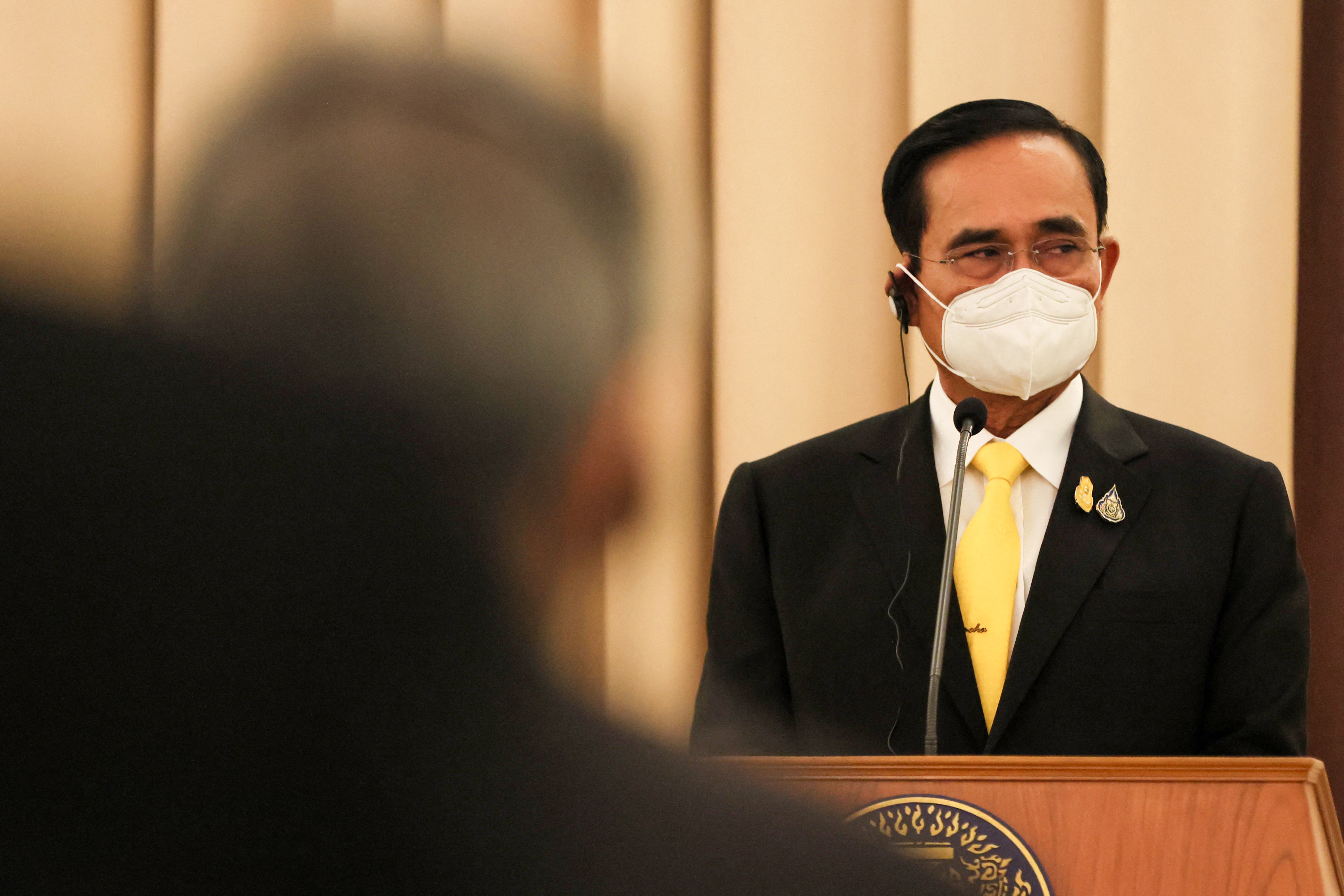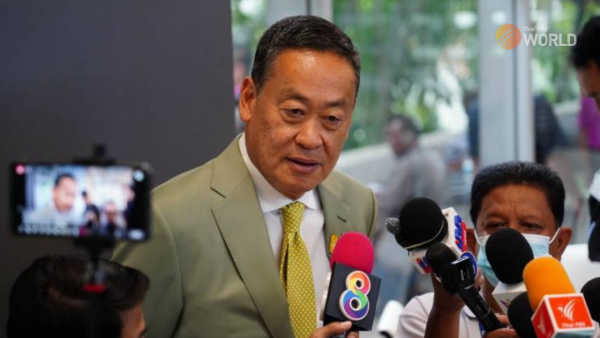Tightrope walk for Thai government as Ukraine invasion brings new challenges

The reverberations from Russia’s invasion of Ukraine are being felt around the globe. The war itself has severely disrupted the production and export of oil, gas, fertilizers, as well as some food products from the two countries.
Thailand depends heavily on imported oil and gas, but the outlook seems bleak as the price of crude oil has soared to over $100 dollar a barrel for several days with the potential to rise further as Russia continues to bombard its neighboring country. Moscow’s actions have been met with harsh economic sanctions by the West and its allies.
Tough decision on excise tax cut
Many Thai manufacturers have warned that at best they could delay increasing the prices of their products by 1-3 months, as they are burdened by higher costs of production due to the soaring energy prices.
Consumers, meanwhile, are also stuck in a low-income scenario amid the slow economic recovery after COVID-19 pandemic and the rising cost of living.
To alleviate the burden on consumers and producers, the Thai government has opted to temporarily eliminate all excise tax on diesel and bunker oil. The decision was made at a Cabinet meeting on March 8.
The latest move follows the Cabinet’s decision on February 15 to cut excise tax on diesel by Bt3 per liter for three months, until May, to deal with the fallout of COVID-19.
Finance Minister Arkhom Termpittayapaisith explained that the removal of the excise tax is temporary – for six months – and it applies only to diesel and bunker oil, which are used to generate electricity. Consumers and manufacturers would not face higher costs for electricity, Arkhom assured.
The careful move suggests that the government is running out of ammunition, given the shortfall in revenue against budgeted expenditure, as well as rising public debt.
The government move fell short of motorists’ expectations of an excise tax cut on petrol.
Praipol Koomsup, an economist who specializes in energy, suggested that the government also cut excise tax on petrol. He said the disparity in the prices of petrol and diesel had widened significantly after the government recently cut excise tax on diesel and provided subsidies to keep its price below Bt30 per liter.
The government is concerned that a higher diesel price will translate into higher costs for the manufacturing and transport sectors. But the government has not provided any subsidy to petrol consumers and allowed the price to be determined by market forces.
“A tax cut on petrol should be in place temporarily. Probably the war may end in the next two months and after that oil prices will fall,” said Praipol.
Targeted subsidy
The current government subsidy on diesel price also benefits rich consumers, though the government’s intention is to support those who operate in the transport and manufacturing sectors, said Pipat Luengnaruemitchai, chief economist at Kiatnakin Phatra Securities.
“For example, those who own a luxury BMW car powered by a diesel engine can also benefit from the tax cut and price subsidy,” he argued. In February alone, the government allocated Bt15 billion to subsidize diesel users, he said.
He also disagreed with the price control policy of the Commerce Ministry to tackle inflation.
The surging inflation rate of 5.28 percent last month has become an issue of concern. And it was largely caused by cost-push, so price control is not the right answer to tackle the problem, he lamented.
At some point, the government may need to allow the prices to rise and then try to provide support to low-income groups, he said.
As the government has limited fiscal space, it needs to apply a targeted approach by helping those who are most in need of support, said Pipat.
Risk of stagflation
Going by the accepted definition of stagflation – low economic growth and high inflation – Thailand has started to enter stagflation, Pipat warned.
Producers are faced with rising costs for goods and services and they are unable to transfer the burden to consumers who are already facing income constraints.
Should producers reduce their output and consumers spend less, it would lead to a slowdown of economic activities.
Finance Ministry officials have indicated that the ministry may consider additional measures to cushion the impact of the higher energy prices. Currently, the ministry has implemented the fourth phase of the co-payment subsidy scheme where consumers and the government pay 50:50 for goods, designed to support consumers hurt by COVID-19.
Each consumer gets a subsidy of Bt1,200 until the end of April.
Threat of inflationary spiral
The government and the Bank of Thailand face a daunting task to deal with rising inflation.
Disruption of production due to the pandemic and the recovery of the global economy, before the invasion of Ukraine, has been blamed for the increase in inflation in many parts of the world. The war has only added to the inflationary pressure.
“For now, Thailand’s central bank may focus on economic growth by keeping its policy rate low. But it may need to increase the rate later,” said Pipat.
The central bank needs to closely monitor the inflation situation and ensure it does not get out of hand.
The inflationary spiral will occur when large and small-scale producers start to believe that it will rise further, so they set their product prices according to their inflation expectations. For example, food sellers may increase the price of their dishes by 5 percent if they think the inflation rate will remain high in the long run, he said.
The US Federal Reserve is expected to raise its policy rate this year to curb inflation. Should the Fed increase the interest rate close to or to 2 percent by the end of the year, it would be significantly at variance with the Thai central bank’s policy rate of 0.5 percent, said Pipat.
“Any widening of the gap between the US and Thailand rates would make the US dollar stronger and the baht weaker, increasing inflationary pressure in our country,” said Pipat.
The war and inflation
The Russia-Ukraine conflict has already impacted wheat and fertilizer prices.
Due to rising wheat prices, animal feed producers are using more of maize produced locally, which is driving up the price of maize. The disruption of fertilizer exports from Russia is already being felt globally.
Experts predict the cost of food production will increase worldwide. Thailand also imports significant quantities of fertilizer ingredients such as nitrogen, potassium, and phosphorus worth about Bt50 billion annually. A short supply of fertilizer could lead to a sharp fall in yields of agricultural products, adding even more pressure to food prices.
Current account challenge
As Thailand is dependent on energy imports, rising fuel prices could lead to a widening of the current account deficit, Pipat warned.
A large current account deficit would further weaken the baht and could encourage capital outflows.
Should the tourism sector fail to recover this year due to the impact of the war, it would add more pressure to the current account, weaken the baht and increase inflationary pressure, he added.
By Thai PBS World’s Business Desk






